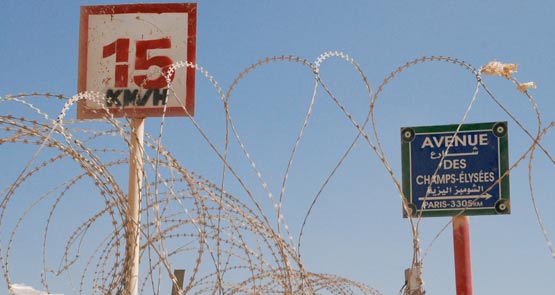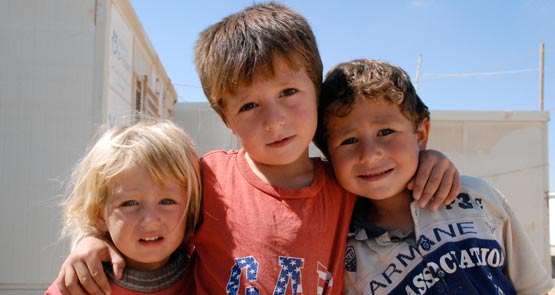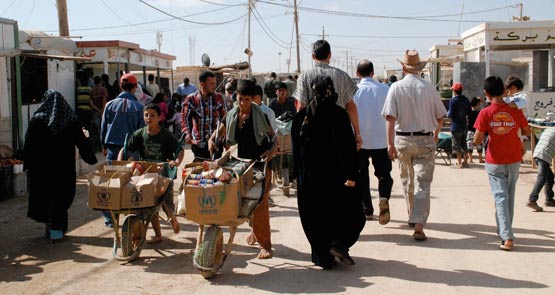
On the outskirts of the Zaatari refugee camp, 15 kilometres from the Syrian border in Jordan, it feels like the edge of the world. But inside the camp, on the “Avenue des Champs Elysees”, is Zaatari’s bustling economic heart. Here it is possible to buy anything from fairy-floss and popcorn, to electronics and perfume; you can rent a wedding dress, get your hair cut, even visit a games arcade (Counter-Strike is popular).
Zaatari is the second largest refugee camp in the world (after Dadaab in Kenya), home to a staggering 120,000 refugees who have fled war-torn Syria. The number is growing daily. More than half are children.
Zaatari is a place of life and activity — take the entrepreneurship and energy of the busy Champs Elysees — but it is also a place where the reality of the Syrian civil war is ever present: every refugee has a harrowing story, of torture or witnessing death and other atrocities first-hand. The adults worry about the safety of their relatives who remain in Syria, some who fight in the Free Syrian Army, while their children struggle to return to a normal childhood, one where they can go to school, make friends and recover.
Crikey is invited inside a “caravan”, which looks more like a shipping container, and offered sweet juice by a group of women who come from a village outside of Dara’a. Dara’a was the city where the Syrian revolution began, and is a site of continuing resistance. The women had farmland and animals before the revolution — that’s now all lost; Assad’s forces mowed down their herds in a missile strike. Amina, the apparent matriarch of the group, recounts her family’s ordeal.
“They [regime forces] would bring a bus to our village and fill it with men and then go,” she says. “They threw them in the bus like animals or goods, so I don’t know how many people. They arrested them and made them praise Assad like a god. And then they slaughtered them.”
Her husband and son were arrested by the Mukhabarat (the notorious Syrian security services). They were jailed in a subterranean torture complex which, according to her husband, went several floors underground. Amina says they subjected her husband and son to degrading treatment: “When my husband washed for prayer they would just push him in the dirt. They stripped them. They came out tortured and unclean. They looked dead when they came out of prison.”
This account fits with the underground prisons described by Human Rights Watch in its Torture Archipelago report. Accounts of detainees being forced by the Mukhabarat to worship Assad as a god are documented, as are other humiliating acts, such as disrupting prayer. These psychological forms of torture have been reported to be used in combination with physical, more extreme forms of torture.
Another woman, Aida, a 50-year-old grandmother also from Dara’a, will not be able to forget the day a missile hit their house and her pregnant daughter-in-law’s heart stopped beating. She was revived, but the trauma prompted her to go into early labour. She delivered the baby, and then died.
These stories of torture and death are told with weary resignation. The normalisation of death and torture, its banalisation, is shocking to witness. One refugee, a teenage girl, showed us a video of a Syrian man missing a jaw. The rest of his skull was intact, he just had a gaping hole instead of a mouth, yet he was still alive. The video was graphic and bloody, but it was saved on her mobile phone alongside pictures of her brother who is still in Syria. The civil war is visceral, and even inside the Zaatari camp, safe in Jordan, it is impossible to escape its digital representation.
Refugees are very aware of the latest news about the conflict. They stand on top of the caravans to get a better signal to call home to Syria. And even if it’s hard to connect, residents get information about the war from new arrivals at the camp — it’s close enough to the Syrian border to sometimes hear the fighting. As Aoife McDonnell, external relations for the United Nations High Commissioner for Refugees office, told Crikey: “You can see Dara’a from here. And two weeks ago, you could feel the ground shake from the fighting and you could hear the mortars.”
As the adults struggle to adjust to life in the camp, and deal with their respective demons, children try to return to some kind of normalcy. McDonnell describes the children’s reaction when planes from a nearby flying school flew over Zaatari: “The planes used to do low flyovers. Half of the children would run outside and shout at the plane. The other half would be hysterical, crying.” Many of the children associated the sound of a plane with the shelling that had been all too common in Dara’a.
Save the Children International, in partnership with UNICEF, has established child-friendly spaces in the camp. Naima Chohan, a child protection advisor with Save the Children International, says some of the children in Zaatari have psychological problems that manifest as aggressive behaviour, wetting the bed and recurrent nightmares where they wake up shouting in the night. Others have “a psychogenic muteness or deafness, or psychosomatic symptoms, such as pains in their bodies”.
However, over time, and with help, Save the Children International generally see improvement. “One girl would not speak, her parents thought she was dumb. Gradually she started making sounds and small words,” Chohan said. With the aid of Save the Children International and UNICEF, some children who were struggling have begun to return to school, to play and make friends.
On the challenge of helping Zaatari’s children, Naima’s colleague Ghandi Al Bakkar said emotively: “We are committed, and addicted, to changing children’s lives and making them better. We can’t turn our backs on them.”

Walking through the camp you see some children whose future seems bright. “Picture, picture,” the children call out in Arabic. Most of them have easy smiles, and ask where you are from. Mohammed is from Dara’a, a seven-year-old who looks more like a boy of four or five. He says he enjoys life in the camp, including school where he studies “everything”. His favourite thing to do in the camp is to play “bayt bayt” (house house), which means to play house with his friends. In the game he pretends to visit his neighbour.
Another child had a sorry face and his arm in a sling. I asked his mother what happened, expecting a war story. “He fell over in Zaatari and broke his arm,” she responded, shaking her head in exasperation. It seems that whatever part of the world they are in, kids will be kids.
Other children use their spare time to visit one of a number of video game arcades on the Champs Elysees, caravans that have a row of computers with boys sitting in front of them, transfixed. No pictures, the boys say. The game Counter-Strike, a first-person shooter game, is very popular. The manager of “Counterstrike Bisun” told me he was frustrated with the way his store had been reported in the media; a Russian journalist had reported such games meant “Syrians were training their children to become terrorists”: “Today is a holiday, that’s why they are playing. The children are normally in school.”
Zaatari’s residents remain resolute, despite the challenges. Many are unhappy with life in the camp, citing problems with the water, and a wish to move from the tents, into caravans, for winter. Their children’s safety, however, trumped their desire to return to their homeland.
Unsurprisingly, the refugees have strong opinions on international politics. A number of refugees dismissed the international community’s efforts as hot air. One woman described efforts by the United Nations to address the worsening conflict as “just words and paper”.
But there is optimism about the Free Syrian Army being able to overcome major organisational differences to form a government, if Assad was to fall. God willing, they said.
When I asked two of the women what fake names I should use, to protect their identity, they said to call them the “free women of Syria”. “Every day we pray for Syria. The whole world won’t help us, only god.”
*Some refugees’ names have been changed to protect their identity. Kim Wilkinson has been based in the Middle East for the summer — she’s studying a Masters in Modern Middle Eastern Studies at the University of Oxford with a thesis topic of “revolutionary humour” in Egypt.








It is nice to hear how resilient some people are. They are able to live their lives and accept what they have after being through so much. Or so you might have us believe. But this is still a pro-FSA article. It is now known that 80% of the FSA has sworn allegiance to al Qaeda and are directly involved in the majority of all jihadist operations against the al Assad Government Forces. Only 2 days ago did an FSA/AQ unit take control of a Jordanian/Syrian border post. The Islamist’s are proliferating yet you continue to report on how accepted the FSA is by the Syrian people. I am starting to question Crikey’s choice of writers on Syria. The trend is that they are pushing the MSM agenda of “bomb al Assad because he is the problem”. Has any of you asked if al Assad might be the good guy here? It would be an interesting angle. Has the question whether al Assad might be the good guy but he may have rogue elements within his military been asked? Or would that be too close to the same story in Pakistan – a current US/Western ally? I question this article as much as I am now questioning my Crikey subscription. If I wanted to read such one-sided BS I’d have saved my money and continued with news.com.au
It is disturbing how many people view the Syrian conflict through the prism of Assad Vs Al Qaeda. Despite the fact that the leadership of a lot of the opposition is Islamist, I would not say that all the fighters are. As some of the mothers in the camp described to me, their sons were university students, but the universities were shut down, thus they took up arms for Syria, for their future, not for God.
I agree with you, in that the bomb or not to bomb question has taken up a lot of news space. In my mind, I think it’s problematic that people are unable to divorce the politics from the human rights situation, and I suppose this is what I was trying to bring to light, some of the things people experienced, their accounts of torture and suffering. I think very few people really know the extent to which torture had been utilised in Syria, despite the fact it well documented by human rights NGOs and journalists.
I’m sorry you feel that the article was one-sided and pro-Islamist. Obviously it was rather difficult speak to someone from the Assad camp. – since Zaatari is made up of people who have a reason to flee Syria, largely those that are being targeted by Assad’s forces. I would be very interested to speak to the pro-Assad camp, however it’s rather hard due to the difficulty of getting into Syria and the dangers for foreign journalists. Maybe I could interview some expats who support Assad, that might make an interesting perspective.
Thanks for the comment and feedback.
OK. Way to throw it back at me with a thank you. Well done.
Completely agree the Syrian conflict is incredibly hard to accurately report on because it is unsafe for journalists to enter and see what is actually happening. But it is not my feeling that your article is one-sided, you agree (correctly) that you found it rather difficult to speak with people on the pro-Assad side. Therefore, it is one-sided.
I have no doubt the horror stories coming out of such camps are rife. But I refuse to believe all those people are running from al Assad’s forces. There must be 100’s of Syrian Christians feeling the Islamic thugs who are systematically being identified and given the option of converting to Islam or die. 100’s if not 1000’s have already been slaughtered by the “rebels”. Viewing the conflict through a prism of al Assad v. AQ is anything but disturbing. What is disturbing is how little is being spoken about it by the majority. What else is disturbing is that the Syrian conflict has morphed into a modern era cold war between the US and Russia. Why hasn’t the Qatari proposal to run an LNG pipeline through Syria into Europe been investigated/reported on more? It’s not a conspiracy theory, it’s open source information that journalists seem to treat as a hot potato. It deserves further investigation. Maybe then the world might join the dots and ask real questions like “is this really about Assad?” Why hasn’t the Saudi involvement been investigated and reported on more? Specifically the Bandar involvement? Or the fact an AP reporter who recently brought some of this information to light was suddenly suspended from her position at the behest of the Saudi’s through a US conduit. All interesting information. Information that requires deeper investigation and reporting on.
But you made your point about the abhorrent treatment some women (and men) endure in this particular camp. It was just a little one-sided and sounded incredibly like the MSM war criers. I’ll dial it down. Thanks for your contribution.